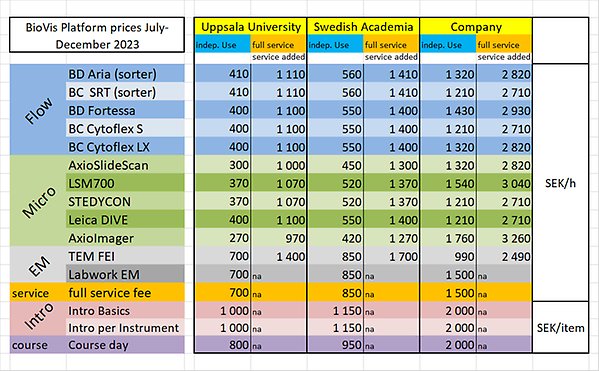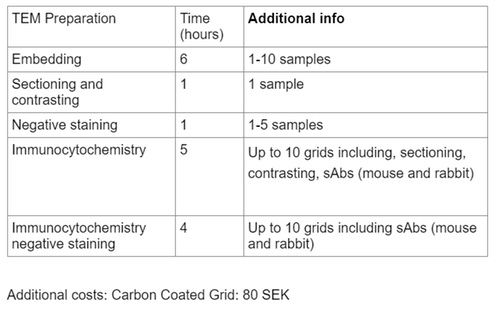Start here - basic information
Newsletter
Flow Cytometry
Thanks to customer supports and support from MedFarm, IMBIM, IGP and SciLifeLab – BioVis expanded to the BMC. The BMC BioVis site offers one Flow Cytometer and (soon) one Confocal Microscope at B11, third floor. UU Campus card is needed to access the room. You reach the room following this mazemap link.
We start with one Flow Cytometer – the Cytoflex S. The Cytoflex S is an Flow Cytometer Analyzer, easy to operate and with the capacity to collect data from 96 well plates (beside normal FACS and Eppendorf-tubes).
To celebrate this expansion we organize a two day event: Inauguration of the BMC BioVis Flow site. More information below under EVENTS.
Events
- Inauguration of the BMC BioVis site
Mark the date: MAY 21/22 Biovis will celebrate the opening of its BMC site. The event will be covering Flow Cytometry and is organized together with BeckmanCoulter. We have confirmed speaker coming from UU research groups of Jenny Hallgren-Martinsson, Yumeng Mao, Stellan Sandler,Gustaf Christoffersson as well as Beckman Coulter product manager James McCracken, USA and David Onion, Flow Cytometry Facility manager of University of Nottingham, UK. The topic´s title are not fully set yet, but will cover
- Mast cells and mast cell progenitors in lung inflammation models.
- Usage of Multiplex beads to detect signaling molecules
- Spectral Flow Cytometry
- Exosomes
- Tips and tricks using the Cytoflex instruments
- analyze data using the KALUZA software
May 21 will be the lecture day, May 22 will be workshop day:
- get to know the Cytoflex S instrument
The number of participants is limited. The event is for free, lunch and fika will be served. Please download and fill in the form if you want to attend the event. Mail to Dirk Pacholsky. Inform us in case the download form is not working for you. Attendance form (excel) download link: Attendance form. Excel, 10 kB.
Light Microscopy
BioVis has a new high end Confocal Microscope – the Leica Stellaris 5, a versatile and user-friendly workhorse, for basic fluorescence imaging to advanced microscopy experiments. An instrument serving most user needs and especially designed to a wide variety of users from beginners to experienced. Sporting the White Light Laser option you can choose and tune in specific excitation wavelengths between 485-790nm. The system offers also the 405 Laser. For detection and collection of the fluorescent emission of your fluorophores, the system offers the free choice of emission bandwith. Fast overview images and images mosaics and stitching, XYYT are included. The Stellaris 5 offers also the TAU technique, time resolved imaging, where difference of fluorescence life times are revealed using fluorescently labeled or unlabeled samples.
Electron Microscopy
BioVis is looking for customers who are interested for FIBSEM, to explore your sample in XY and Z.
Courses
BioVis own courses are online and published. You find them under the Menue “Courses and Introductions”
NEW BOOKING SYSTEM
BioVis will change booking system to iLab. This will happen during Summer (August) - have your iLab profile ready for September bookings. iLab has partnered with Uppsala University, KI and KTH, which gives our customers easy access to other facilities.
Link to iLab: https://community.agilent.com/
General Information
- General Information
BioVis offers a wide range of different instruments. In general BioVis has three nodes: Electron Microscopy, Flow Cytometry (and Cell Sorting), Light Microscopy. More information is available under the Technology section.
We are mainly situated at Rudbeck Lab and have a small site at BMC. The BMC site offers one Flow Cytometer and (soon) one Confocal Microscope at B11, third floor. UU Campus card is needed to access the room. You reach the room following this mazemap link.
An Introduction to the Instruments given by BioVis Staff is priority for all customers, before using BioVis´Instruments independently.
Full Service can be booked, where BioVis staff is handling the customers´ processed sample on the Instrument.
An Acess card is needed to enter BioVis Premises.
Approved users have access to the facility 24 hours a day 7 days a week. However after 17:00, and during weekends, access is restricted to experienced users who are familiar with the instruments and can preform some trouble shooting themselves.
BioVis may be closed for all customer during shorter periods, concerning vacation. This will always be announced at least two months in advance giving you plenty of time to plan your experiments accordingly.
Report all instrument problems directly to BioVis staff and make a note in the logbook every time you have used an instrument.
Bring the consumables you will need to perform your analysis, like cell-strainers, tubes, glass slides and cover slips etc. They are not included in the fee.
Access Card
- Entrance card & Access
In order to enter BioVis premises at Rudbeck Lab, you need to have a valid card. Customers of IGP and Rudbeck need only access granted on their existing cards. An access card can be obtained via BioVis. The access card is personal and must not be lent to a colleague. Access cards are given out to customers who have received Instrument introductions and use our instruments.
Please contact Jeremy.Adler@igp.uu.se for more details regarding access cards. Observe that your cards will be valid for one year in total. Have the access card form Excel, 13 kB. ready to be sent to Jeremy.
Since 240411 we have a FlowCytometer at the BMC, B11 third floor. See General Information menue for more details.
Instrument Introductions
- Instrument Introductions
BioVis gives introductions to its instruments once per month. The introduction contain in-depth lectures and hands-on sessions on the instrument. Introduction to the instrument is a priority to be an independent customer. You can apply for introductions under Introductions.
Booking System
- Booking
Use the Seshat booking system to book and cancel an instrument, do not book more time than you need. Reservations must be made for the whole duration the system is in use, this includes start-up, cleaning and shut down. Uppsala university customers can log in with their AKKA account, customers outside Uppsala University must contact BioVis for an account. It is possible to cancel your booking in Seshat up to 24 h prior to start. You will be charged according to how many hours you book.
Please read our detailed tutorial and guideline about booking in Seshat, here Pdf, 3 MB..
BioVis will change booking system to iLab. This will happen during Summer (August) - have your iLab profile ready for September bookings. iLab has partnered with Uppsala University, KI and KTH, which gives our customers easy access to other facilities.
Link to iLab: https://community.agilent.com/
Service & Prices
Instruments
BioVis offers a wide range of different instruments. In general BioVis has three nodes: Electron Microscopy, Flow Cytometry (and Cell Sorting), Light Microscopy. More information is available under the Technology section.
Services
- Flow Cytometry, Cell Sorting, Light Microscopy
BioVis offers its customers independ use of instruments or Full Service. For independent use of Instruments, customers are obliged to have been trained by BioVis staff. Apply for it under Instrument Introductions. Full Service can be booked. Here staff is handling the instrument, using your (processed) sample. BioVis offers also Consulting to discuss and guide projects concerning experimental design (in relation to instrument use).
- Electron Microscopy
BioVis offers its customer a full service mode from sample preparation to imaging.
Prices for Services
BioVis is mainly financed by the MedFarm Faculty of Uppsala University and service prices are subsidized for UU customers. A detailed price list can be seen below BioVis has a three level price setting: Uppsala University, Swedish Academia, Full cost price. Within this levels you will find Independent use and Full service, as well as different categories like Courses etc.


Acknowledgements
Acknowledgements
Our customers are obliged to acknowledge BioVis (and staff if applicable) inn case results are published where BioVis services were used.
Example: The BioVis platform of Uppsala University was used to conduct experiments using “technique /Instrument”, supported by “Staff name “.
Data Safety / Biological Safety
- Biosafety
All work involving biosafety class 2 organisms on BioVis instruments must be performed according to Uppsala University regulations. You are obliged to inform us about any potential hazards.
The use of lentiviral vectors has been increasing because they allow highly efficient gene delivery in a wide variety of cell types. Samples of lentivirus-transduced cells pose a higher degree of hazard than other samples submitted for analysis. Have such samples in culture for one week so virus activity is ceased.
- Data storage
We cannot be held responsible for the misuse, loss and manipulation of data stored on our computers. You are allowed to store data temporarily on our computers. Always transfer your data to a trusted storage medium. Details on how to handle your data will be found on the instrument computer desktop. We export all stored data from instrument computers on a regular basis. We will always inform our users before this happens. Our data share computer is a public computer, all BioVis users will have access to your data there.
PhD & Customer Courses
BioVis offers also courses in Image Analysis based on the usage of Image J. BioVis runs two PhD courses, Methods for Cell Analysis , and Introduction to Image Analysis Software.
You find more information under Courses.
